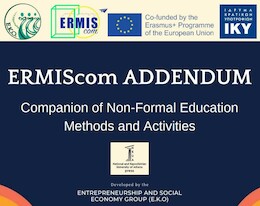Toolbox — For Training and Youth Work
All new tools in your inbox: Be the first to know about new tools for learning with our e-mail notifications.
Manual
ERMIScom Addendum - NFE activities for Media and Journalism Education
A compilation of 60 non -formal education activities that can be applied in the context of Higher Education as part of the formal curriculum in the fields of Journalism, Media & Communication.
Aims of the tool
Students who go to university will be the future decision-makes, business leaders, intellectuals and citizens. As such, they need to acquire the vital transferrable skills to navigate this world successfully. However, formal education can sometimes be too focused on theory and not provide students with enough practical experience. It is, therefore, important for universities to change their approach and teach students not only specific knowledge, but also practical skills and good values, in order to succeed in life beyond the classroom.
Media students, in particular, need to cultivate soft skills during their formal studies because the related professions require a wide range of competencies beyond just theoretical knowledge and technical competences. Critical thinking, communication, collaboration, adaptability, and creativity are essential for journalists to succeed in today's dynamic media landscape.
The ERMIScom Addendum aims to address this gap and provide Higher Education teaching staff in Journalism, Media and Communication with a pool of non-formal education tools, tailored to enhance their students’ learning experience and skills’ acquisition.
Description of the tool
The ERMIScom Addendum is a compilation of 60 non -formal education activities that can be applied in the context of Higher Education as part of the formal curriculum in the fields of Journalism, Media & Communication.
The activities included in each separate chapter of the Addendum target the same concepts, skills, and attitudes as the corresponding Intellectual Output (IO)/Course of the ERMIScom curriculum:
COURSE I: Stereotypes and Prejudices: Xenophobia and Racism
Skills: Intercultural awareness & Communication, Perspective-taking, Empathy
Concepts: Cultural identity, Other/Otherness, Stereotypes & Prejudice, Xenophobia & Racism
COURSE II. Fake News and Hate Speech: Representation of Vulnerable Groups in the Media
Skills: Source credibility assessment & fact-checking, Critical thinking
Concepts: Conscious & unconscious biases, Mis-, Mal- & Disinformation, Hate speech & Discriminative Discourse
COURSE III. Social Entrepreneurship and Vulnerable Social Groups
Skills: Leadership skills, Open-mindedness & Innovation, Creative problem-solving, Teamwork
Concepts: Characteristics, challenges, and shared value of social enterprises (SEs), Business Model development, Social Impact and impact measurement
COURSE IV. Vulnerable Groups And Cultural Trauma
Skills: Data research & analysis, Ethical approach when targeting vulnerable groups, respect for diversity
Concepts: Vulnerability, Cultural and collective identity, Cultural trauma & presentation in media
COURSE V. Integration Policies for Vulnerable Social Groups
Skills: Intercultural awareness & communication, Production of innovative research ideas, Critical thinking
Concepts: Protection of vulnerable groups Rights, European Policies on asylum/migration, unemployment, poverty, elderly and COVID crisis, Media representation and integration
COURSE VI. Funds & Grants: Social Integration And Rights Related Projects
Skills: Creativity & Innovation, Active citizenship attitudes, project planning & management
Concepts: EU funding areas & programs, EU-Recovery Plan, Transparency, EU policy and programs targeting integration of vulnerable groups
COURSE VII. Transformative Methodological Approach: Teaching, Training, Learning
Skills: Learning to learn, Personal development planning, self-reflection, mindfulness, collaborative learning & teamwork, sense of agency
Concepts: Constructivism & Socio-constructivism, Cognitive & meta-cognitive skills, Phenomenon-based approach to education, Practical pedagogical approaches
Moreover, the Addendum is not limited to formal education settings, but may also be used in non-formal education workshops or other learning activities delivered by NGOs and youth workers
Available downloads:
Disclaimer
SALTO cannot be held responsible for the inappropriate use of these training tools. Always adapt training tools to your aims, context, target group and to your own skills! These tools have been used in a variety of formats and situations. Please notify SALTO should you know about the origin of or copyright on this tool.
Tool overview

http://toolbox.salto-youth.net/3643
This tool is for
Media/Journalism students, educators and professionals
and addresses
Social Inclusion, Intercultural Learning, Personal Development, Peer education, Youth Participation
It is recommended for use in:
Youth Exchanges
Strategic Partnerships
Behind the tool
The tool was created by
Entrepreneurship and Social Economy Group
in the context of
ERMIScom project (2020-1-EL01-KA203- 078981)
The tool was published to the Toolbox by
Kitty Panourgia (on 11 July 2023)
and last modified
8 May 2023
Comments
No comments have been posted yet.
If you want to comment on this tool, you need to be signed in with your MySALTO account. Sign in now